THE ZONE OF INTEREST (2023)
Auschwitz commandant Rudolf Höss and his wife Hedwig strive to build a dream life for their family in a house and garden beside the camp.
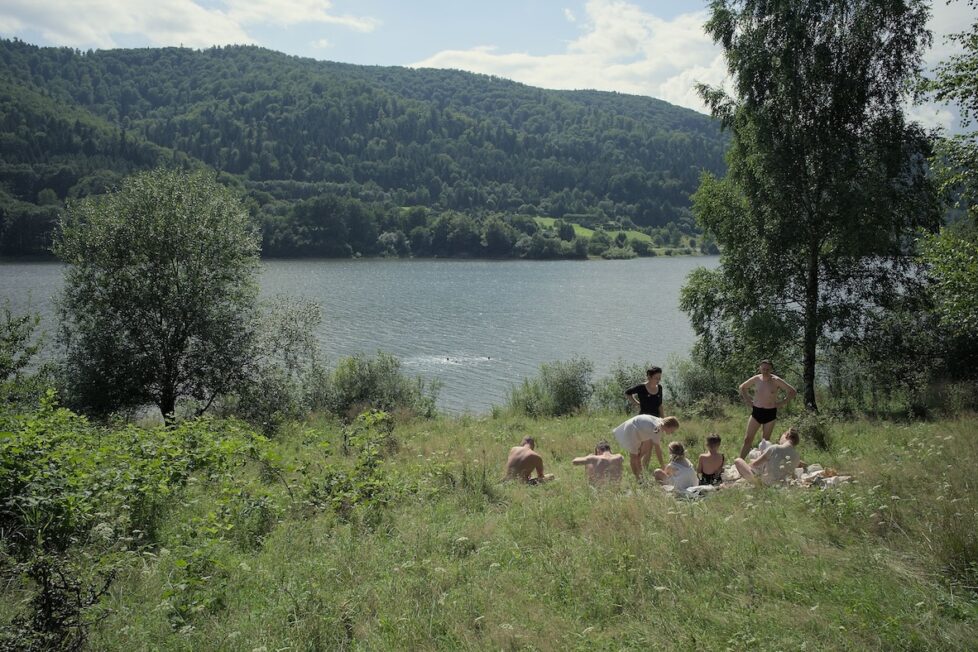
Auschwitz commandant Rudolf Höss and his wife Hedwig strive to build a dream life for their family in a house and garden beside the camp.


What first struck me about The Zone of Interest was its ’12A’ certificate. In the US, that’s equivalent to a ‘PG-13’. Given the subject matter—the Holocaust (or any genocide, for that matter)—most adult-oriented films in this genre would receive a higher rating. For instance, Schindler’s List (1993) was rated ’15’ by the BBFC.
However, that’s precisely what makes The Zone of Interest so fascinating. What a typical film in the Holocaust “genre” (if such a term can be applied with respect) would likely dwell upon is deliberately relegated to the periphery here. Strip away the historical backdrop and ominous atmosphere, and what remains is a beautifully filmed and acted family drama, ultimately rendered uninteresting.
It’s just ordinary middle-class people, including a cleaner’s daughter who’s landed on her feet and married a government big shot, experiencing mundane daily dramas. She wants to stay in the countryside with their children, but he is being transferred by his bosses. They dine, they laugh, they fight; yet, through it all, their lives are intertwined by the ties of love and family. However, just beyond their border wall, the chilling command to drown a man for stealing an apple rings out. Meanwhile, a portly engineer in a sharp suit has arrived, brandishing plans for new ovens capable of incinerating much larger “loads.” Elsewhere, piles of other people’s clothes materialize, soon to be divvied up among the household.
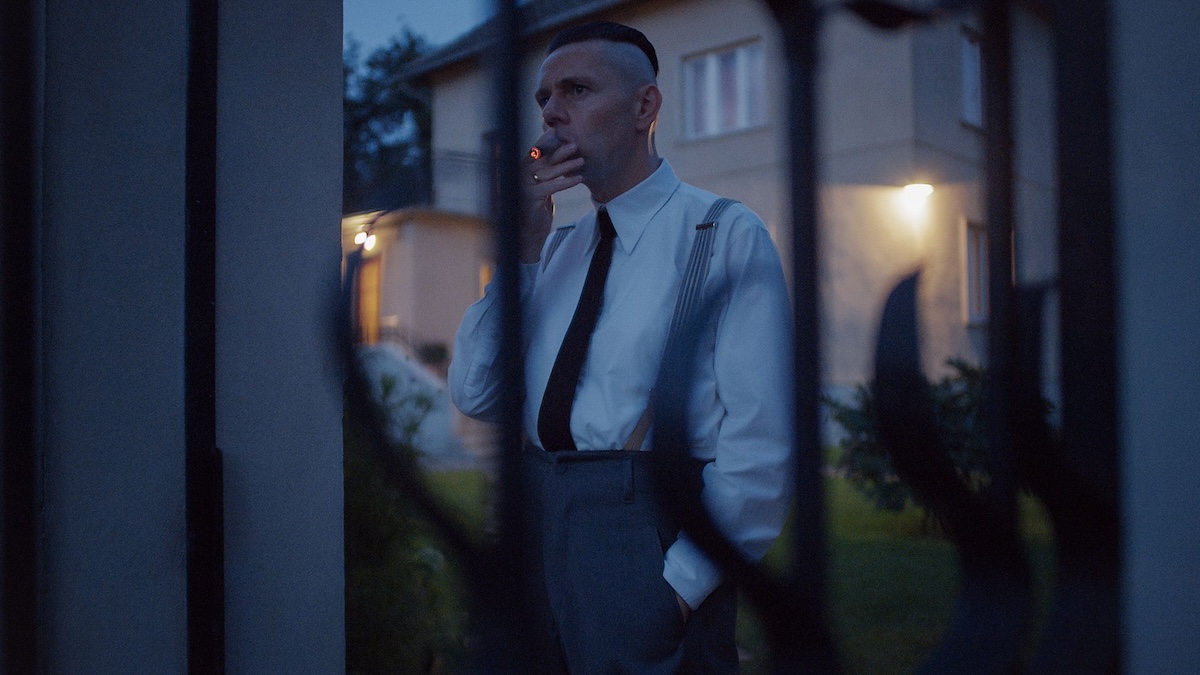
Written and directed by Jonathan Glazer (Under the Skin), the film takes inspiration from Martin Amis’ novel of the same name, which centred on an Auschwitz officer’s obsession with the commandant’s wife. However, Glazer wisely steers away from a direct adaptation, embracing a plotless approach that gives the film its unique power. Christian Friedel (Babylon Berlin) portrays Rudolf Höss, the real-life Auschwitz commandant with the longest tenure before his execution in 1945. Sandra Hüller (Anatomy of a Fall) takes on the role of Hedwig Höss, his wife, who survived the war and lived until 1989.
While other characters, some real and others possibly fictionalised, weave in and out of the narrative, our primary focus remains on Rudolf and Hedwig. Their zone of interest, however, is not on affairs of the heart but rather the idyllic home they’ve built in the peaceful Polish countryside. The film’s true “plot” doesn’t delve into romances between officers, commandants, and their wives. Instead, it meticulously peels back the layers of the Höss family, initially depicted as ideal and serene in the painterly opening shots, seemingly embodying the Third Reich’s “Kinder, Küche, Kirche” ideal. However, over time, their proximity to the camp’s constant belching flames and ash gradually poisons their perfect world.
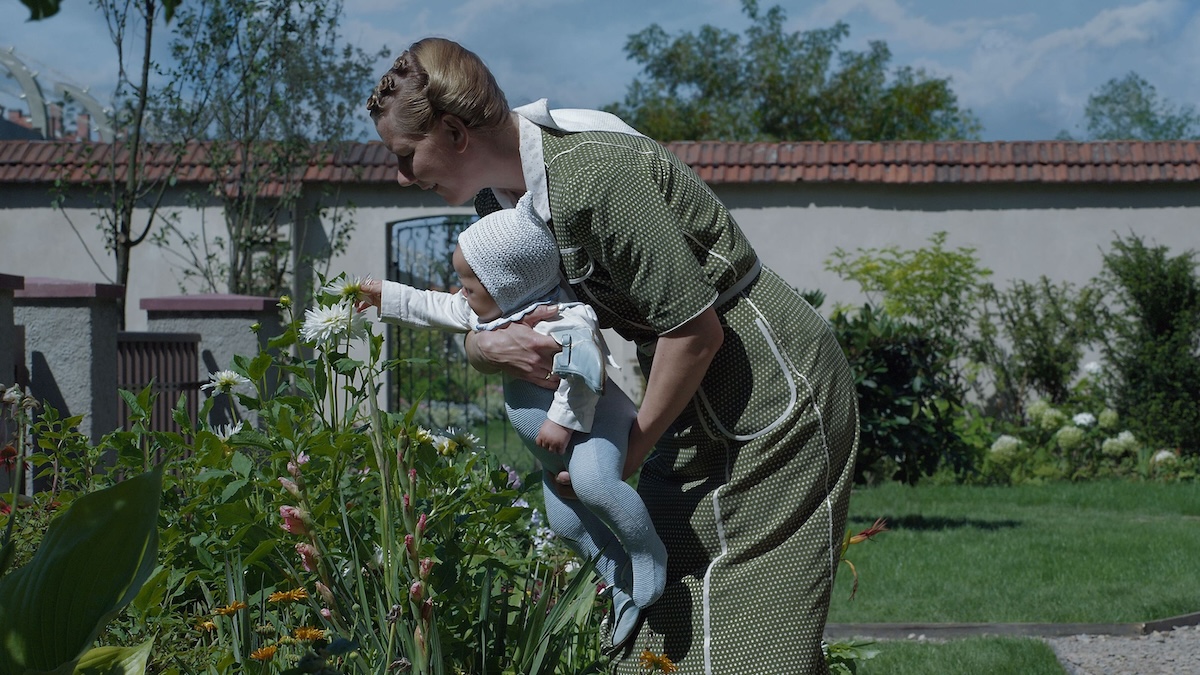
The camera never grants us access to the heart of the camp, just as Hedwig and her children never would have seen it. Yet, the film doesn’t shy away from revealing the insidious influence it exerts. Consider the Höss brothers: one a playful child, the other an adolescent. We first encounter them at a sun-drenched lake, the older carrying the younger in brotherly affection. Yet, by the film’s end, that same hand slams shut the door of a greenhouse, trapping his brother in an act of sibling cruelty. Even with their relative innocence and limited exposure, the evil seeping from the camp has seeped into them, normalizing the unthinkable. This film compels us to acknowledge the undeniable truth: proximity to such horrors leaves no one untouched, regardless of age or privilege.
I was reminded of two recent stories that disturbed me. One involved a Russian grandmother celebrating the low price of strawberries, seemingly oblivious to the fact that their cheapness stemmed from them being stolen from war-torn Ukraine. The other was a TikTok clip of an Israeli leaving their home as missiles targeted Gaza, expressing gratitude to their government for the security they felt knowing those weapons would soon hit their targets—targets that represented people, homes, and entire communities.
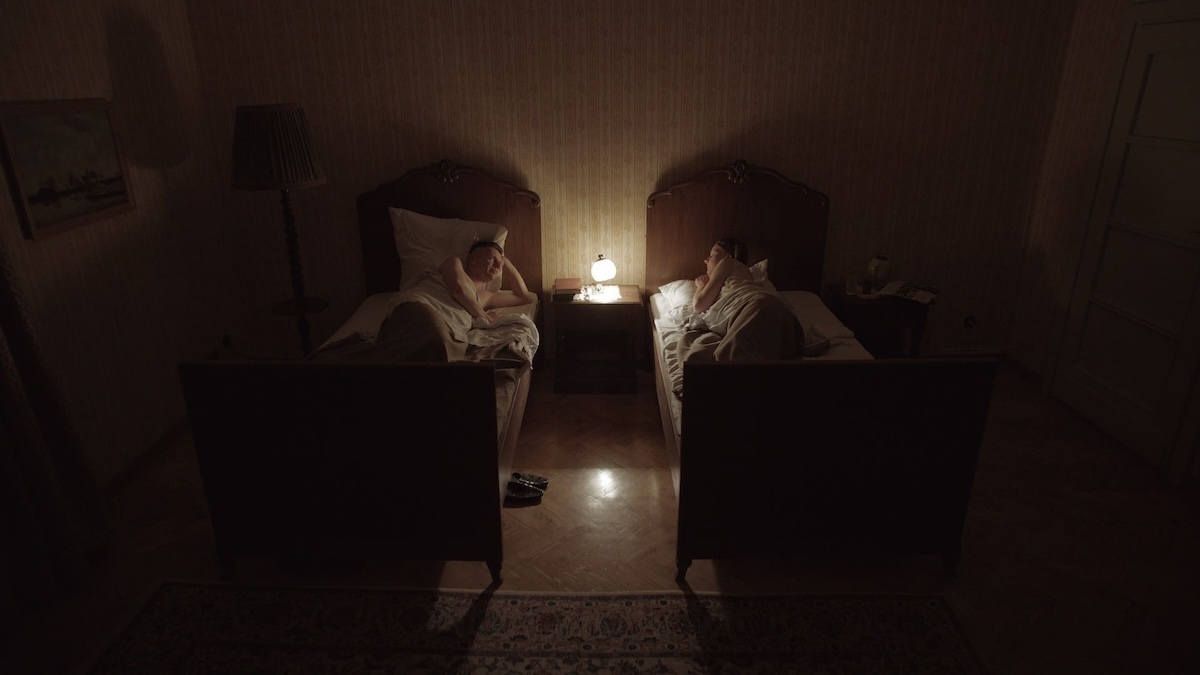
Holocaust media, in recent years, has begun generating a form of fairy tale literature that interprets the 20th-century’s most significant atrocity through a simplistic “goodies vs. baddies” lens. Examples include The Boy in the Striped Pajamas (2008) and Heather Morris’s 2018 novel The Tattooist of Auschwitz, itself being adapted into a TV series starring Harvey Keitel. These narratives portray magical innocents trapped in the clutches of sneering villains, resembling narratives found in castles.
What makes The Zone of Interest stand out is its ability to strip away both morality and sentiment, to a greater extent than any other recent work of this genre. It presents a mundane group of people, just like you and me, caught in the machinery of the Holocaust. The focus shifts from “Nazism” to the universality of the human experience and its potential for complicity. In short, it’s not about Nazis. It’s about you.
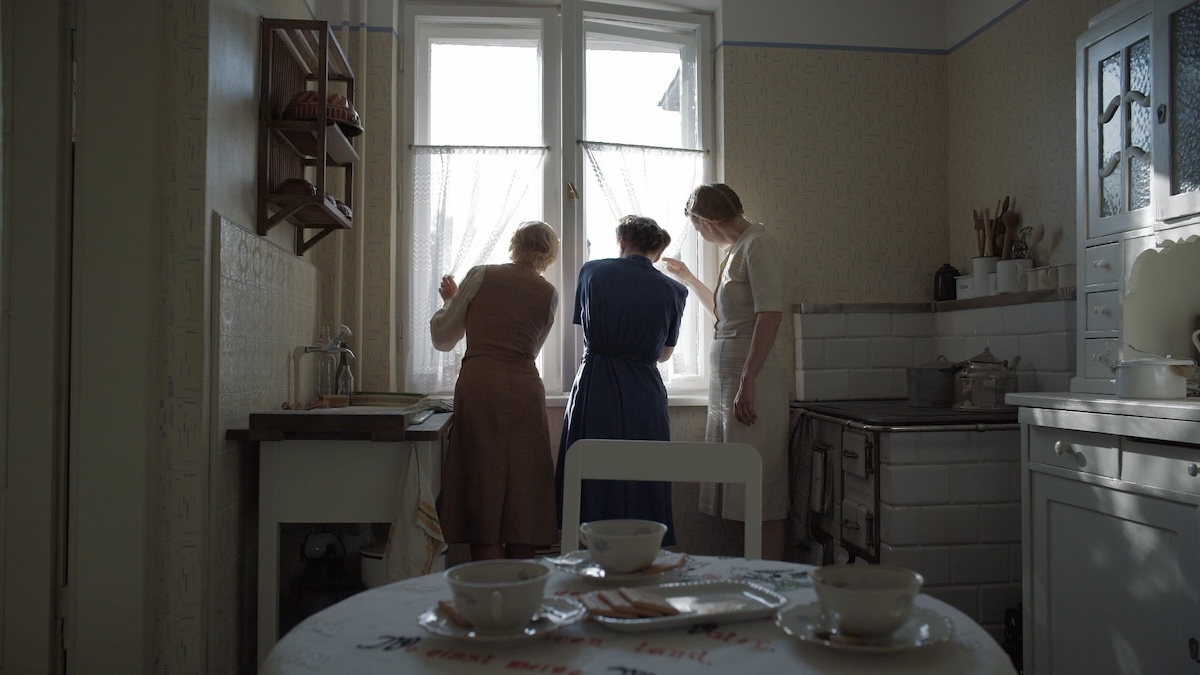
The Hösses aren’t all that different from you and me when it comes to family dynamics, hopes, and dreams. Hedwig speaks of farming after the war, visiting spas in Italy, and raising her children in the best circumstances possible. Her fur coat might have once belonged to the woman her mother cleaned for, now likely trapped beyond the wall, or in the pits. Her children might play with gold teeth, no doubt extracted from unwilling mouths. But how many of us can honestly say that we haven’t benefited from barbarity in some way? We may not be as directly complicit as the commandant’s wife, or live next door to the children sewing our clothes, but… we all have our blind spots, where self-interest prevails.
Much has been written about the “banality of evil” in this film, stemming from philosopher Hannah Arendt’s concept in her 1963 book, Eichmann in Jerusalem. This book focused on the trial of Holocaust organiser Adolf Eichmann, whom she described not as a sociopath or fanatic, but as a dull individual with no ambitions beyond personal advancement. Imagine, perhaps, an extreme version of a middle manager working for a morally dubious insurance company.
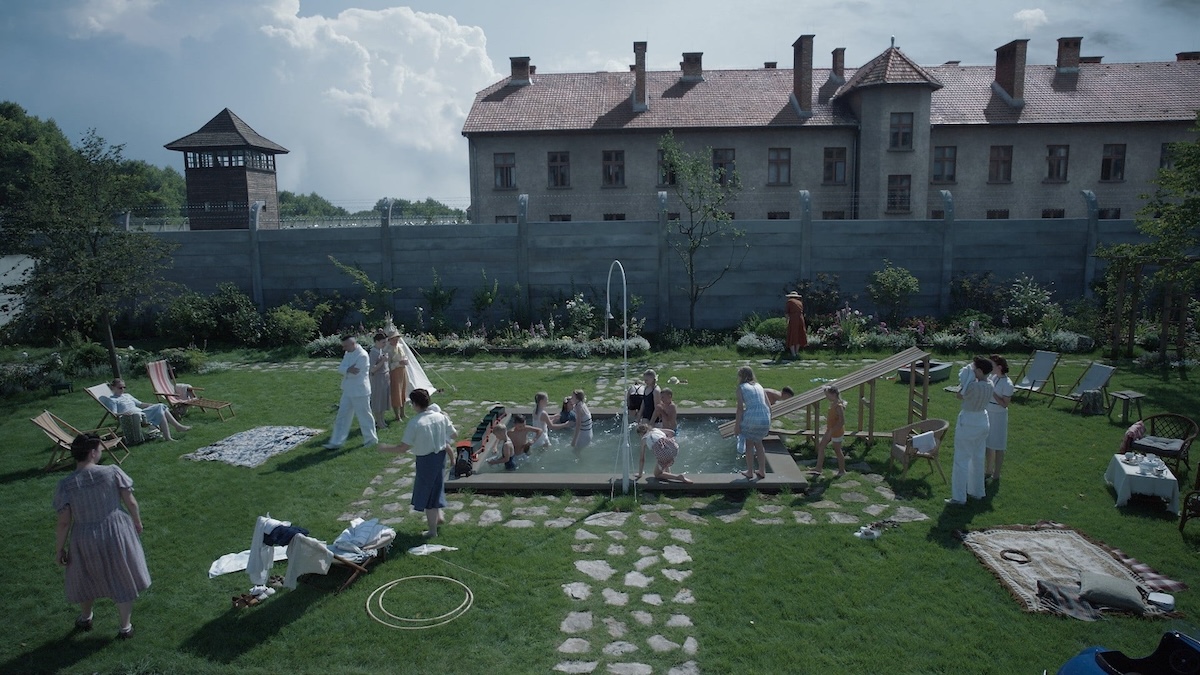
While banality plays a role in Glazer’s film, it’s not the complete picture. Perhaps a more fitting word would be “everydayness.” The scenes depicting routines of domestic drudgery evoke the French feminist film Jeanne Dielman, 23 quai du Commerce, 1080 Bruxelles (1975), where the titular character’s repetitive tasks – bed-making, meal preparation – contribute to her eventual mental breakdown.
Hedwig doesn’t succumb to outright insanity (in the conventional sense), but witnessing her and her parlourmaids manage the household, day in and day out, evokes a haunting echo of encroaching madness. The film’s score weaves in distant screams, flames, and crackling gunshots, subtle enough to avoid consciously disturbing the family yet lingering just beneath the surface while they fill their days with distractions. This veil of normalcy holds until the physical effects intrude, as demonstrated by the hasty scrubbing of the children after a canoe trip, necessitated by a downpour of ash from Auschwitz’s chimneys.
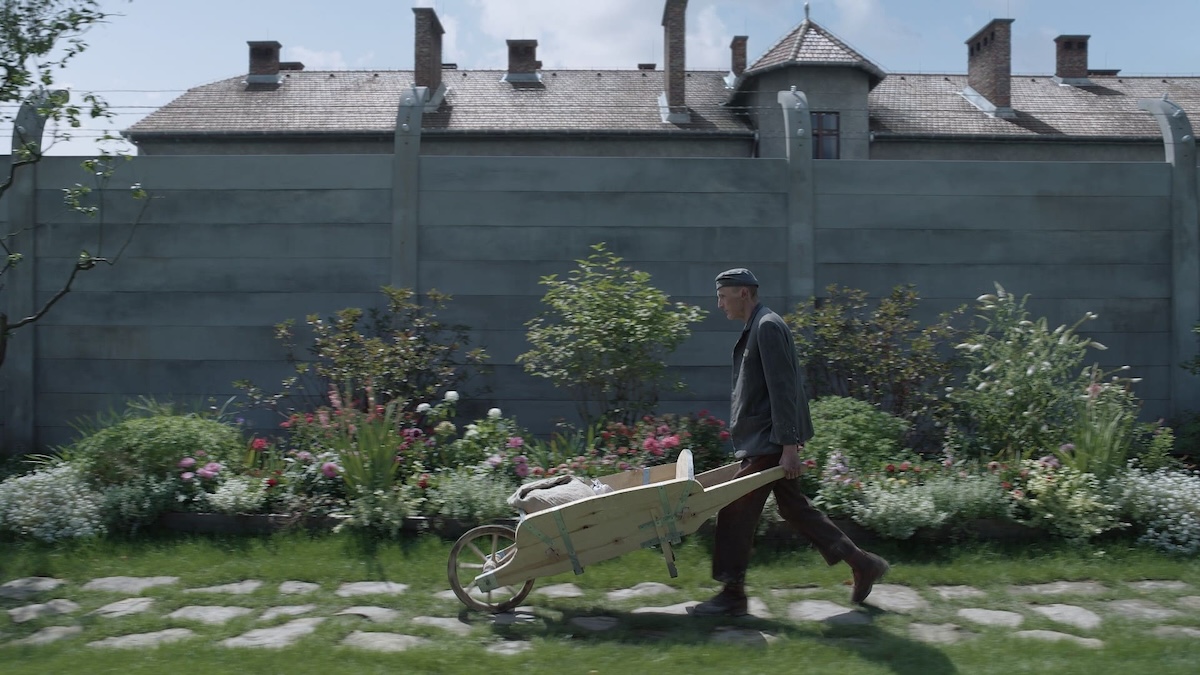
At times, Glazer departs from his painterly realism, interjecting symbolism. Midway, a sequence appears of the commandant’s flower garden, teeming with bees. This idyllic scene abruptly shifts to a block red screen, accompanied by a persistent, ominous hum. The imagery evokes the iconic poppy fields associated with World War I but twisted with a perverse, sinister undertone. Stop and smell the flowers, until the blood pours in.
In this vein of symbolism, The Zone of Interest delivers one of the most quietly haunting endings I’ve witnessed. Avoiding spoilers, the film intercuts present-day footage from Auschwitz with the descent of a character through a large, empty, and echoing edifice. Without overtly forcing any specific interpretation, the scene evokes a ghostly atmosphere. This juxtaposition of the “future” with the “present” creates a chilling effect, suggesting that the character glimpses the legacy of their actions in a single, terrible moment. Despite, and even because, it never ventures beyond the confines of Höss’s garden, The Zone of Interest emerges as one of the darkest films ever made about the Holocaust.
USA • UK • POLAND | 2023 | 105 MINUTES | 1.78:1 | COLOUR | GERMAN • POLISH • YIDDISH

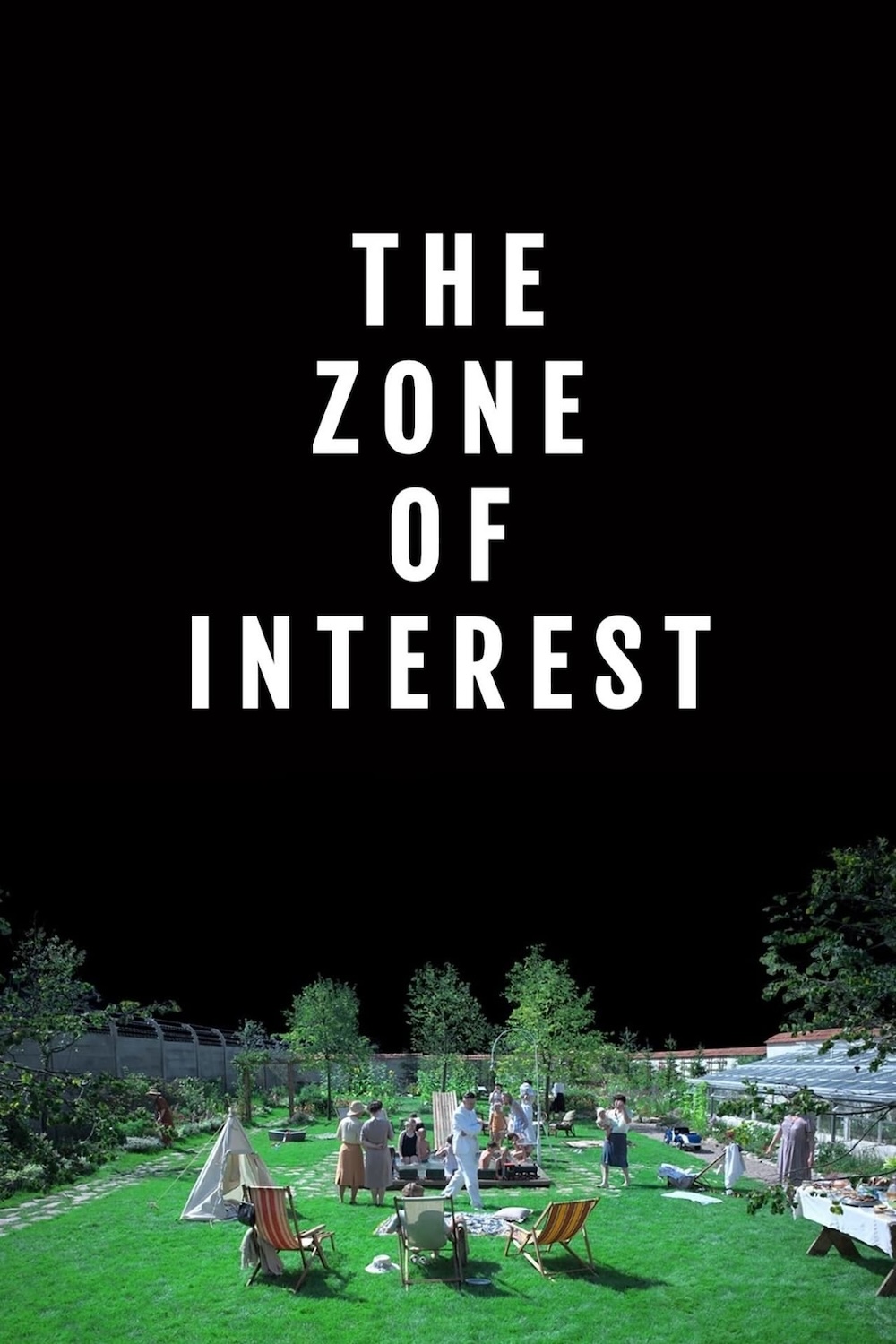
director: Jonathan Glazer.
writer: Jonathan Glazer (based on the novel by Martin Amis).
starring: Christian Friedel, Sandra Hüller, Ralph Herforth, Daniel Holzberg, Sascha Maaz, Freya Kreutzkam & Imogen Kogge.
